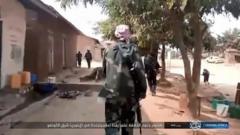What Happened in DR Congo That Left Dozens of Mourners Dead?

Published: 2025-09-09 15:36:07 | Category: world
This tragic incident highlights the increasing violence in the eastern Democratic Republic of Congo (DRC), where over 50 individuals lost their lives during a funeral ceremony due to an attack by rebels linked to the Islamic State (IS) group. The assault underscores the escalating threat posed by the Allied Democratic Forces (ADF) and the growing concerns regarding security in the region.
Last updated: 10 October 2023 (BST)
Key Takeaways
- Over 50 people were killed in a night-time attack by the ADF in North Kivu province.
- The victims were mainly attacked with machetes during a funeral ceremony.
- The ADF has been linked to a series of violent incidents in both Uganda and the DRC.
- Nearly 90% of IS operations are now conducted by affiliates in Africa.
- This incident raises concerns about the increasing strength of the ADF insurgency.
Background on the Allied Democratic Forces
The Allied Democratic Forces (ADF) originated in Uganda during the 1990s, primarily as a response to perceived persecution of Muslims by the Ugandan government. Initially, the group aimed to establish an Islamic state in Uganda. However, following significant military pressure, the ADF retreated into the forests of eastern DRC, where it has since re-established itself and expanded its operations.
Today, the ADF is known for its brutal tactics, employing weapons such as machetes, and is notorious for attacking civilians. The group has been responsible for numerous atrocities, including massacres, kidnappings, and sexual violence. Its affiliation with the Islamic State's Central African Province has further emboldened its activities, leading to a rise in violent attacks across the region.
The Recent Attack in Ntoyo
The latest attack occurred on a night when villagers gathered for a mourning ceremony in Ntoyo, a small village in North Kivu province. Eyewitnesses described the scene as one of "utter carnage," with many victims caught off guard. Local administrator Macaire Sivikunula confirmed a provisional death toll of over 50, with reports indicating that victims were primarily hacked with machetes. Some individuals were also burnt in their homes during the assault.
DR Congo army spokesman Lieutenant Marc Elongo stated that soldiers arrived at the scene after the massacre had already taken place. This suggests a significant gap in timely military response, raising questions about the effectiveness of local security forces in protecting civilians from such attacks.
Ongoing Violence and Security Concerns in the DRC
This incident is part of a broader pattern of violence in the eastern DRC, which has seen a marked increase in attacks attributed to the ADF. In July, over 40 people, including nine children, were killed during a night vigil at a church in Komanda, another region affected by ADF violence. Such attacks not only claim lives but also instil fear and disrupt local communities, making it increasingly challenging for residents to carry out daily activities.
According to reports, nearly 90% of Islamic State operations are now executed by affiliates in Africa, with the ADF being one of the most prominent groups. This statistic underscores the shifting dynamics of terrorist activities and the increasing focus on Africa as a theatre for extremist violence.
What Happens Next?
In the aftermath of this tragic event, several questions loom large over the future of security in the DRC. The Congolese government and military face immense pressure to improve their response to such insurgencies. Enhanced efforts are necessary to safeguard civilians and restore stability in regions plagued by violence.
International attention will likely increase, with calls for humanitarian assistance and support for the Congolese army. However, the situation remains fluid, and the ADF's capabilities may continue to grow if not adequately countered. Analysts suggest that without a cohesive strategy to address the underlying issues of poverty, governance, and human rights, the cycle of violence is likely to continue.
Conclusion
The recent attack in North Kivu province underscores the growing strength and brutality of the Allied Democratic Forces in the eastern Democratic Republic of Congo. As violence escalates, the international and local communities must address the root causes of this insurgency while providing immediate support to affected populations. The urgent need for strategic interventions cannot be overstated, as the safety and stability of the region hang in the balance.
FAQs
What is the ADF?
The Allied Democratic Forces (ADF) is a militant group that originated in Uganda in the 1990s. It is now based in the eastern Democratic Republic of Congo and is known for its violent attacks against civilians, often employing brutal tactics.
Why are attacks by the ADF increasing?
Attacks by the ADF are increasing due to various factors, including their affiliation with the Islamic State group, local grievances, and the ongoing instability in the eastern DRC, which provides a conducive environment for insurgent activities.
How has the international community responded to ADF violence?
The international community has expressed concern over ADF violence, with calls for humanitarian assistance and support for military operations aimed at countering the group's activities. However, responses can vary based on geopolitical interests and local dynamics.
What can be done to improve security in the DRC?
Improving security in the DRC requires a multifaceted approach that addresses underlying issues such as poverty, governance, and human rights. Strengthening local security forces and enhancing community engagement are also crucial steps.
What is the impact of ADF violence on local communities?
ADF violence severely impacts local communities, leading to loss of life, displacement, and disruption of daily activities. It creates an atmosphere of fear and instability, making it difficult for residents to rebuild their lives.
As the situation unfolds, it is crucial for regional and international stakeholders to take collaborative action to address the threats posed by the ADF and ensure the safety of civilians in the DRC. #ADF #DRCviolence #HumanRights



